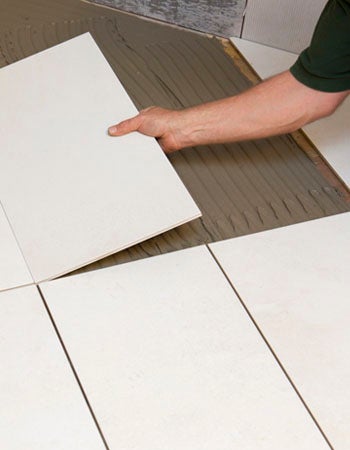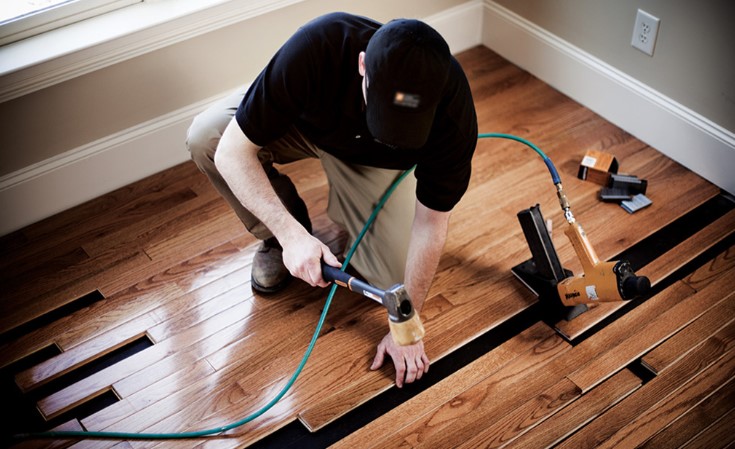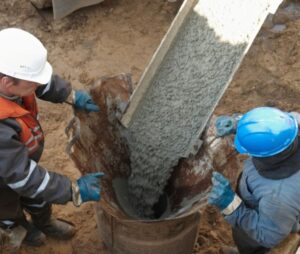How Much Does Tile Installation Cost? Breaking Down the Cost to Install Tiles (2023)
Highlights
- Tile installation costs between $890 and $3,029, with the national average cost at $1,959.
- The final cost depends on numerous factors, including the type of tile, the installation location, and the cost of labor.
- Homeowners often choose to install tile for its durability, low-maintenance and low-allergen nature, and ability to increase home value.
- While some homeowners may have enough experience to install tile themselves, hiring a professional can avoid incorrect cuts and breakage, saving money in the long run.
Installing tile flooring, backsplashes, and showers is a durable way to update a home’s look. Tile is a sought-after design element for kitchens, bathrooms, laundry rooms, and more. Tile often adds a classic and timeless look while being a long-lasting and low-maintenance option. When considering tile installation cost, it helps to know the additional price factors that go into the project. According to HomeAdvisor, the average tile installation cost for porcelain or ceramic tile flooring is between $890 and $3,029, with the national average at $1,959. Expect to pay around $4 to $115 per square foot for installation and materials. Tile installation costs for kitchen or bathroom remodels can vary depending on where the tile is being installed and the type of tile chosen, among other factors. Labor costs can range from $3 to $15 per square foot, and some professionals charge between $60 and $120 per hour. To find the best tile for you and your budget, search online for “tile flooring near me.”

Carpet, hardwood, vinyl, and tile flooring.
Bob Vila has partnered with Empire Today to help you easily get beautiful new floors at a great price.
Free In-Home Estimates
Factors in Calculating Tile Installation Cost
Calculating tile installation cost depends on a few factors. Prices can differ from the national average of $1,959 due to the size of the project, labor, prep work, the type and rating of the tile, and installation site.
Size of the Project
Most professionals will charge based on the square footage of the project area. The larger the area that needs to be tiled, the lower the cost per square foot. To figure out the area that will be tiled, measure the length and multiply by the width. For example: 10-foot by 12-foot room = 120 square feet. It’s always helpful to slightly overestimate to allow for broken tiles or unusually shaped cuts.
Labor
Labor can cost from $3 to $15 per square foot. Labor to install a tile floor costs between $7 and $19 per square foot and $23 to $35 per square foot for backsplashes and countertops. The square footage will usually determine labor prices, but some professionals may charge by the hour. If that’s the case, prepare to pay between $60 to $120 per hour, depending on the project.
Area Preparation
The more prep work needed before tile can be installed, the more expensive the project will be. Installing tile on a smooth and even surface will take less time and require minimal prep compared to tiling over old and uneven flooring. Flooring that needs to be removed and replaced or walls and countertops that need repair will raise the overall price of the project.
Type of Tile
The type of tile will directly affect the installation cost. Consider where you want the tile to go, and choose the tile based on its strength, quality, and where it’s best used. Certain types of tile are not appropriate for flooring but will work for countertops or backsplashes.
Tile Rating
Tiles have a specific rating system that tells you where they should be installed. The rating system goes from Class I to Class V, with Class V as the most durable.
- Class I. Class I tiles are not strong enough to use as flooring, and they should only be used as wall tiles.
- Class II. These tiles are best suited for light-traffic areas, such as bathrooms.
- Class III. Class III tiles can be used for countertops, walls, and areas with average foot traffic.
- Class IV. These tiles can be used in any area of the home.
- Class V. Class V tiles are the most durable and are recommended for industrial or commercial use.
Tiles can also be classified by their porosity. Porosity refers to how many air pockets the tile has. Tile porosity is rated by what degree it is glass-like (or vitreous). The more porous a tile is, the more absorbent it is. Tiles that have a high level of absorbance are better suited to areas that don’t have a lot of moisture. There are four levels of tile porosity.
- Non-vitreous tile. Non-vitreous tile costs between $1 and $5 per square foot. Some examples of this absorbent tile are terra cotta and bisqueware. Since it’s the most absorbent, it’s best suited for wall tiling or for use as decorative touches.
- Semi-vitreous tile. Semi-vitreous tile is most commonly used in areas outside of the bathroom. The average cost runs from $4 to $8 per square foot.
- Vitreous tile. Vitreous tile can cost between $4 and $8 per square foot. It’s most often used in bathrooms except for shower areas. Vitreous tile is water resistant on its surface, but not on the back or sides. Repeated exposure to moisture or direct contact with water over an extended period of time could affect the water resistance.
- Impervious tile. Impervious tile is the most glass-like and is the least absorbent. It works best in areas of high moisture with direct water exposure. This type of tile runs from $5 to $10 per square foot.
Installation Location
Tile installation costs will be different depending on where the tile is placed. Kitchen backsplash or countertop tile installation typically costs more than flooring tile. If you’re installing tile in a high-moisture area or a location with direct water contact, the tile needs to be nonporous. Typically, the more vitreous the tile, the more expensive it is.
Additional Costs and Considerations
When budgeting for tile installation, there are usually additional price factors and considerations. These can include other materials, subfloor repair and installation, and geographic location.
Additional Materials
Backer board will need to be installed if you have a wood subfloor. Since wood will warp if exposed to excessive moisture, it’s not the ideal base for tile installation. Backer board supplies a level and solid cement surface to lay the tile, and it’s commonly used in bathrooms. Backer board can cost between $5 and $8 per square foot and is usually included in the overall cost of labor.
Subfloor Repair
If the existing subfloor needs repair, it can average $40 to $65 per square foot. If a concrete subfloor needs to be resurfaced, expect to pay an extra $3 to $10 per square foot for additional costs. Additional labor hours and materials are needed to level the floor and make sure it’s a smooth surface for the tile installation. In order to make the subflooring ready for the tile, the installer must fill any holes or cracks while also ensuring that the subfloor is clean and dry. Next, a latex primer needs to be applied to prepare the surface for installation. Finally, the installer needs to make sure the subflooring is level and use a self-leveling compound if needed.
Adding a kitchen backsplash?
Top-rated pros can do the tiling for you. Get free, no-commitment estimates from experts near you.
+
Subfloor Installation
If the subfloor is too damaged to repair, a contractor may recommend installing a new one.
Geographic Location
Geographic location can impact tile installation cost. Densely populated urban areas usually have a higher cost of living, which directly affects labor costs. Coastal areas and places that experience higher humidity levels may have elevated prices due to the difficulty of tile installation in those environments.
Types of Tile
The type of tile you choose will affect tile installation cost. Each type has its own advantages and is suited for specific uses. The following are the most common types of tiles.
Porcelain
One of the most common tile materials is porcelain. Porcelain tile can cost from $3 to $30 per square foot. Thin porcelain costs more than thicker tiles because of the process it undergoes to be durable despite the thinness of the tile. It’s helpful to know the Porcelain Enamel Institute (PEI) wear rating if you decide on porcelain tile. Tiles are rated from 1 to 5, depending on durability and where the tile should be used. Tiles that are rated a 1 or 2 are best used for bathroom walls or as a backsplash. Tiles rated 3 to 5 are suitable for flooring and countertops. Porcelain is stain resistant and works well in areas with high levels of moisture.
Ceramic
Ceramic is another common tile material. Ceramic tiles can cost between $1.25 and $100 per square foot. Ceramic isn’t as durable as porcelain, but it’s a more budget-friendly material. Installing ceramic tile over a cement floor is typically more expensive than installing it over a wood floor that’s in good condition. Ceramic tile is scratch-, dent-, and stain-resistant, and it will maintain its color even if it’s exposed to direct sunlight.
Porcelain Wood Tile
Porcelain tile that’s made to look like wood averages $1 to $10 per square foot. These tiles are typically cut into rectangular planks but are still priced by the square foot. This is an excellent choice for those who enjoy the look and warmth of wood grain while benefiting from tile durability.
Vinyl
Vinyl tile is available in a variety of colors as well as in stone patterns and wood grain. This budget-friendly option can cost between $1 to $3 per square foot. This popular tile option is durable and provides a dependable walking surface in your home.
Stone
Natural stone tiles can cost between $5 and $12 per square foot. Stone tiles are durable but not as strong as ceramic tiles. Stone tiles are typically cut to fit the size of your space and provide a unique look. Many homeowners are drawn toward the color variations and natural beauty of stone for countertops, flooring, bathrooms, and backsplashes. This material is prone to scratches and chips and will need annual sealing to prevent staining and water damage. Some natural stone material options are granite, limestone, clay, basalt, pebble, onyx, marble, travertine, sandstone, and slate.
Rectified Tile
Rectified tiles are cut after the firing process, so each tile has precise edges and measurements. It’s available in many different styles in ceramic or porcelain. The price can run from $1 to $6 per square foot. Some homeowners opt for rectified tile if they’re looking for minimal grouting between tiles or if they want tiles larger than 15 inches.
Slate
Durable slate tiles have a dark, earthy texture with an upscale aesthetic. Slate is available in more colors than just dark gray. It sometimes is found with mixtures of brown, tan, gray, green, and even purple. Slate has a naturally grooved texture, but it’s available in a sanded smooth option as well. It’s extremely durable and can stand up to daily wear and tear. Slate does scratch easily so it’s best suited to areas like a kitchen or bathroom. Slate is challenging to install due to the weight of the material. Expect to pay two to three times the price of the material for installation costs. Slate tiles run from $8 to $15 per square foot.
Glass
Glass tiles average approximately $12 to $26 per square foot. Glass is not a flooring material and isn’t recommended for outdoor use. Still, it’s suitable for use as a backsplash, in a shower, or as a countertop. Glass tiles are available in various earth tones such as brown, green, yellow, blue, gray, and red. They’re commonly available in 12-inch by 12-inch tiles that are made up of either random or uniform shapes that have the appearance of a brick wall.
Tile Installation Cost by Location
Where you install the tile within your home affects the overall price of tile installation. Here are some of the most popular places to install tile in a home and the average costs.
Kitchen Floor
The average cost to install tile for a kitchen floor is $1,208 to $2,415 for a 161-square-foot kitchen. The price difference is due to the price range for different tile materials. The kitchen configuration and the condition of the subfloor will also affect the cost.
Kitchen Backsplash or Countertop
Expect to pay between $10 and $40 per square foot for a kitchen backsplash or countertop. The price per square foot is higher for these jobs due to the complex work to install smaller tiles.
Adding a kitchen backsplash?
Top-rated pros can do the tiling for you. Get free, no-commitment estimates from experts near you.
+
Bathroom Floor
The cost to tile an average 75-square-foot bathroom floor is $563 to $1,125, depending on the tile material.
Bathroom Wall
It can run between $7 and $25 per square foot to tile bathroom walls. The average-size bathroom is 5 by 8 feet. The price to tile two walls would be between $780 and $2,600. Cement backer board would raise the price by $6 per square foot.
Shower
It will cost between $450 and $10,000 on average to tile a shower. This price typically includes prep work, backer board installation, and tile and grout installation.
Benefits of Adding Tiles
Installing tile can improve the appearance of your kitchen, bathroom, laundry room, or patio. No matter your style, tile can reflect your tastes with various colors, textures, styles, and shapes. Here are some of the benefits of adding tiles to your home.
Durability
When it’s installed correctly, tile can last a lifetime. Tile is durable and, when properly sealed, it’s also stain- and scratch-resistant. It maintains its color even when in direct sunlight, and porcelain tile is considered more durable than granite.
Low-Maintenance
There’s no need for special cleaning products since tile is easy to maintain and keep clean.
Allergen-Free
Those with allergies are opting for more tile in their homes since tile is impervious to mold, dust mites, germs, bacteria, and other allergens.
Appeal
Tile is an outstanding choice when it comes to upgrading the look of your home. From replacing old, chipped countertops and dull, outdated flooring, tile can brighten up and update your home.
Increase in Home Value
Adding tile is one way to increase your home’s value. Most major home improvements will increase the value, but tile flooring will always add value to your home due to its durability and longevity.
Tile Installation: DIY vs. Hiring a Professional
Tackling this project on your own will cost between $9.50 and $51 per square foot, compared to $13.50 to $83 for a professional to complete the installation. Inexperience could lead to incorrect cuts and grout application or breakage. These mistakes could end up costing more to fix than hiring a professional from the start. Unless you have extensive experience, it’s recommended to leave tile installation to the pros. They have the right tools for the job and can finish the installation a lot faster than an inexperienced DIYer.
Don’t figure it out on your own
Top-rated pros can do the tiling for you. Get free, no-commitment estimates from experts near you.
+
How to Save Money on Tile Installation Cost
Tile installation costs can be high, and the additional costs associated with the project can quickly add up. One way to save on tile installation is to buy the cheapest material, but there are other ways to save without compromising quality.
- Use bigger tiles. Larger tiles cost less to install than smaller tiles since there is less labor involved.
- Avoid intricate designs. Complex tile designs cost more than the standard installation due to the time and expertise needed.
- Install tile in select areas. Use tile in smaller areas or scale back the project to just one room in the house.
- Rip out the old flooring yourself. You can save on labor by removing and hauling away the old flooring yourself.
- Get multiple estimates. Contact at least three contractors to get the best price for you and your budget.
Questions to Ask About Tile Installation
Asking a professional the right questions about tile installation cost can minimize miscommunication, save money, and get the desired results. Here are some questions to ask tile installation professionals.
- Do you have references?
- How long have you been in business?
- Are you bonded and insured?
- What is included in the estimate?
- What type of warranty do you offer?
- How long will the project take?
- Can you help me pick out the tile that’s right for this project?
- Is labor charged by the square foot or the hour?
FAQs
Deciding on the right tile for your home while staying within your budget can be a daunting process. Here are some frequently asked questions about tile installation costs to help guide you in your decisions.
Q. How much does it cost to tile a 10-by-10-foot room?
On average, it costs between $15 and $20 per square foot to tile a room. For 100 square feet, it would cost between $1,500 and $2,000.
Q. How long does it take to tile a 10-by-10-foot room?
It can take approximately 16 hours for a novice to tile a 10-by-10-foot room.
Q. How long will my tiles last?
Most types of ceramic, porcelain, and terra cotta tile can last 50 years or more.
Q. Which is better: porcelain tile or ceramic tile?
The answer depends on where you’ll be using the tile. Porcelain tile works the best in areas with a lot of moisture, like bathrooms, showers, or sink backsplashes. Porcelain floors are harder and denser, but ceramic is more comfortable to walk on and stays cooler than porcelain. The decision comes down to cost and function.
Sources: HomeAdvisor, Thumbtack, Nerdwallet, HomeGuide













